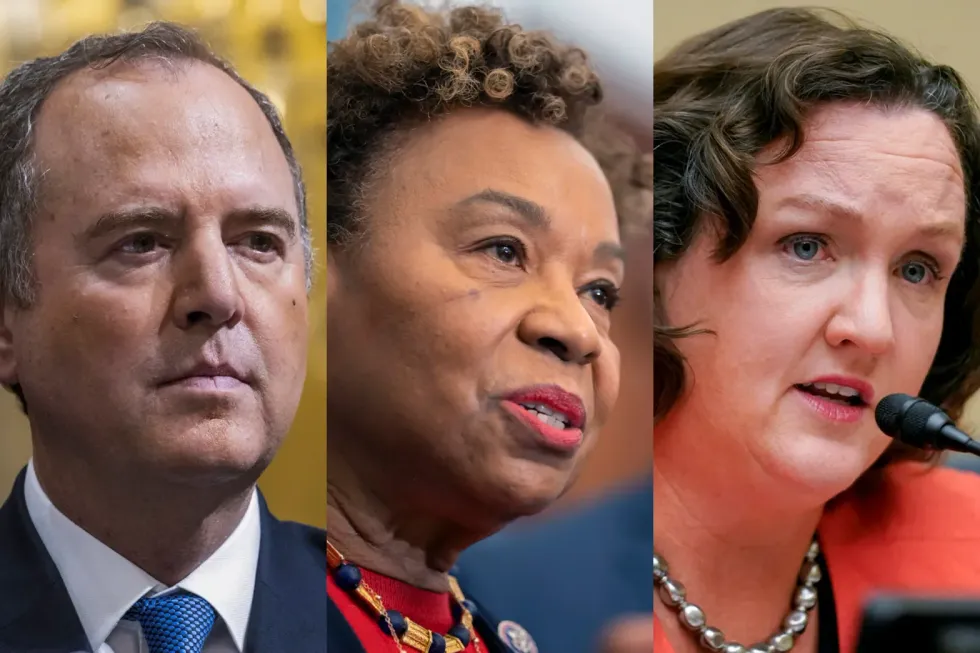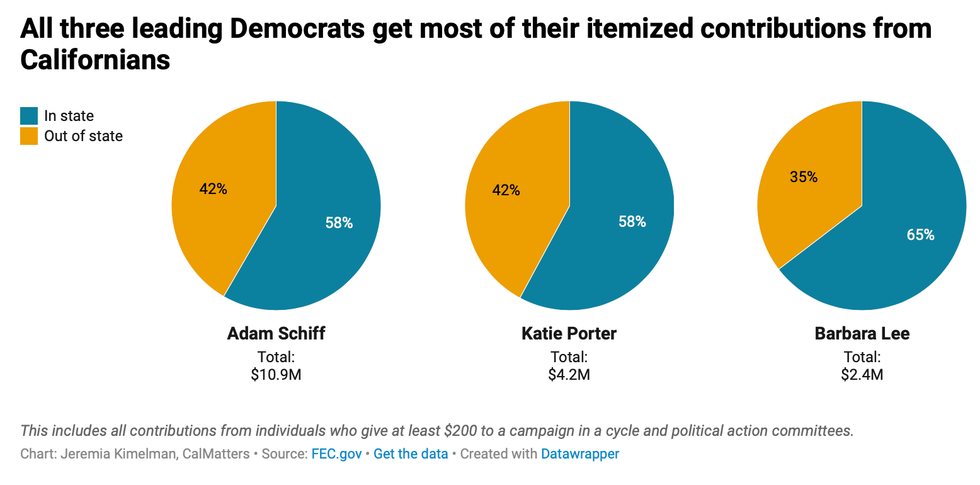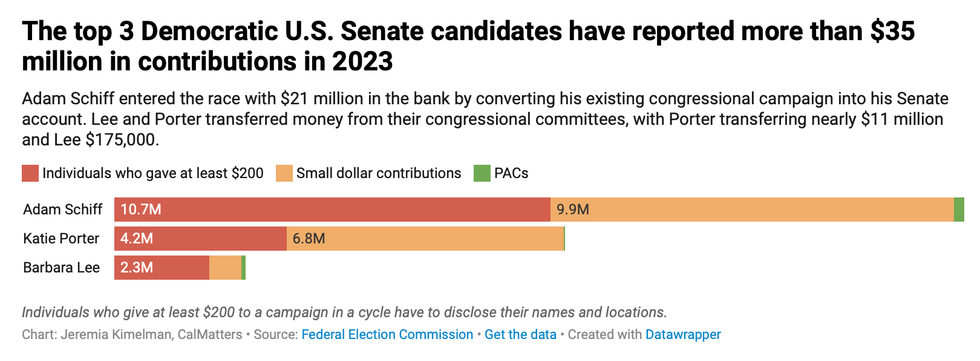Does Steve Garvey have a shot against Adam Schiff for U.S. Senate?
This story was originally published by CalMatters, nonprofit, nonpartisan media venture explaining California policies and politics.
Adam Schiff has likely punched his ticket to the U.S. Senate.
Placing first in California’s top-two primary as of Thursday, the Democratic U.S. representative is heading into the November election against former L.A. Dodgers legend Steve Garvey — the Republican in second place, but a long shot at winning a California statewide election.
The Associated Press declared the Schiff-Garvey matchup with 38% of the expected votes counted Tuesday night.
In his victory speech, Schiff thanked his supporters and touted Republicans’ criticism of him. “It looks like we are going to the general, ladies and gentlemen,” Schiff told cheering supporters in Los Angeles.
But his speech was interrupted by protesters calling for a ceasefire in Gaza. Faced with “Ceasefire Now” chants, Schiff responded: “We are so lucky, so lucky to live in a democracy where we all have the right to protest.”
In the separate primary to serve out the final few weeks of Feinstein’s term, Garvey is narrowly leading Schiff as of Wednesday night.
The matchup is good news for Schiff, whose campaign shelled out tens of millions of dollars elevating Garvey’s name among Republican voters to make sure of that outcome. The ad blitz helped shut out progressive Democratic Rep. Katie Porter, who could have posed a formidable threat to Schiff in the general election.
Some Democrats are breathing a sigh of relief, too: They had worried that a Schiff-Porter matchup would suck up campaign cash from Democratic donors, potentially leaving few dollars to down-ballot candidates, particularly those in battleground congressional districts who could determine control of Congress, Politico reported. But now, Schiff could spread his wealth to benefit Democrats in those races, political strategists say.
Garvey celebrated with supporters in Palm Desert on Tuesday night. “Welcome to the California comeback. What you are all feeling tonight is what it’s like to hit a walk-off home run,” he opened his victory speech.
 Republican U.S. Senate candidate Steve Garvey fields questions during his election night party in Palm Springs on March 5, 2024. Photo by Gregory Bull, AP Photo Credit: AP
Republican U.S. Senate candidate Steve Garvey fields questions during his election night party in Palm Springs on March 5, 2024. Photo by Gregory Bull, AP Photo Credit: AP“Keep the evening of November 5th open, as we will celebrate again,” Garvey added. “They say in the general election that we are going to strike out. You know what? That’s from the crowd that believes in the status quo.”
But Garvey’s primary win has likely set him up for a loss in November: There are not enough Republican voters — or GOP donors — in California to propel him to victory, and no national GOP groups will invest much in winning a statewide seat in deep-blue California, said Republican strategist Jon Fleischman.
“The math doesn’t make sense to try to win California at the expense of spending all that money on states where they can be a lot more competitive,” he said.
The matchup, however, dismayed progressive supporters of Porter, in third place with 15% of the vote Tuesday night, and Lee, in fourth place with 7%.
Porter told supporters in Long Beach that special interests and billionaires spent millions to keep her out of the U.S. Senate and that too many in power just want to stay in elected office. “I will always, always be fighting for you,” she said in ending her concession speech Tuesday night.
The Schiff-Garvey runoff means that, for the first time in more than 30 years, California will be represented by two male senators (Alex Padilla was elected in 2022), one of whom will be white.
“We have two old white men in this incredibly diverse and dynamic state … fighting to replace Dianne Feinstein’s seat,” said Thad Kousser, professor of political science at the University of California San Diego. “This looks like your grandfather’s California.”
Charlene Bennett, a 57-year-old Lee supporter who works as a manager in the state government, said she wanted to see a woman of color win the seat.
“I don’t think it’s just enough to say, ‘I support women,’” Bennett said after voting at the downtown Sacramento public library. “When we talk about women’s rights, reproductive rights, we need to have a woman there in the moment when decisions are happening.”
Formidable fundraiser
Schiff, the most prolific fundraiser in this race, spent $38 million to both secure his own spot in the general and effectively handpick his opponent in November. What lies ahead for him is likely a clear path to victory: In deep-blue California, no Republican has won a statewide race since 2006.
He can now spend some of his campaign war chest on Democrats in California’s down-ballot races, or on Senate candidates in more challenging states, such as Sen. Jacky Rosen in Nevada, said Democratic strategist Michael Trujillo.
“The Senate side is gonna get to see how Adam can fundraise and get his donors engaged in other swing seats that keep the Senate for Democrats,” he said.
The fundraising power he could use to benefit other Democrats would help establish him as a “national Democratic leader,” Kousser said.
“He’s shown that he’s one of the fundraising stars of his party. And once you secure your seat, you’ve got to use that star power to help your team rather than just yourself,” he said.
Butting heads on Trump, other policies
Former President Donald Trump’s influence has loomed large in the race, and may be here to stay.
Schiff has fundraised off Trump’s name, touting his role leading the first impeachment trial against Trump in 2020. He has cashed in on Trump’s attacks on him and the vote by a Republican-controlled House to censure Schiff over his comment during investigations into Trump’s ties to Russia.
On Tuesday, he wore it as a badge of honor.
“At the urging and badgering of Donald Trump, the Republicans censured me for holding him accountable,” he said during his victory speech. “And then Trump would attack me rally after rally. And I think all those things were basically what we would call Wednesday.”
 Adam Schiff addresses his supporters during an election night watch party in Los Angeles on March 5, 2024. Photo by Ted Soqui for CalMatters Credit: Ted Soqui c 2024
Adam Schiff addresses his supporters during an election night watch party in Los Angeles on March 5, 2024. Photo by Ted Soqui for CalMatters Credit: Ted Soqui c 2024That record gained him votes among Democratic voters in this race. Ben James, a 38-year-old hotel engineering manager in Sacramento, said that was the main reason he chose Schiff over Porter.
“We have to do anything we can to prevent (Trump’s presidency) from happening again,” James said.
Garvey — who said he voted for Trump in 2016 and 2020 — has so far declined to say whether he would support Trump in November, arguing it’s his “personal choice.” But Schiff’s campaign has portrayed Garvey as a far right candidate associated with Trump in his ad blitz.
“All people know about him is that he stands with Trump, because that’s what the Adam Schiff commercials will make it look like,” Kousser said.
Garvey’s vague stance on Trump, however, has not hurt his chances with Republicans, Kousser noted.
While some Republican candidates in California can’t afford to criticize Trump due to their deep-red base, in a statewide race, “you can’t win a general election in California as the Donald Trump candidate,” he said.
Schiff and Garvey will likely continue to clash on multiple other issues in the next eight months, such as the U.S.-Mexico border, homelessness, immigration, climate change and the economy. In CBS exit polls, primary voters picked the cost of living as the most important issue facing California, followed by immigration and homelessness.
Garvey has called for a shutdown of the southern border, arguing that the country should prioritize legal immigration and curb drug and human trafficking. Schiff, on the contrary, has advocated for more resources for migrants at the border and disagreed with President Joe Biden’s administration on tightened asylum policies, calling them “wrong.”
The two are split on the federal minimum wage, with Schiff calling for a $20 hourly rate indexed to inflation and Garvey supporting the current $7.25. They have also taken different tones on fossil fuel energy in California. Schiff said he supports moving away from fossil fuel energy, while Garvey stressed during debates that the country “runs on gas and oil.”
Invigorating GOP voters?
Garvey’s presence on the ballot — broadcast statewide thanks to Schiff’s ads — could have driven up GOP turnout and helped down-ticket Republican candidates, Fleischman said.
“Adam Schiff’s strategy may send him into the runoff against Steve Garvey, but it might also elect some Republicans down ticket that he didn’t intend,” he said.
But will Garvey’s presence be enough to energize GOP voters in the general election? Unlikely, since the single biggest driver of turnout remains the presidential race, not a U.S. Senate election, political experts say.
“We are going to forget that this race is even on the ballot come November,” Kousser said.
But Garvey’s message and vision could find its audience with some voters, who are looking for a different brand of Republican Party, Kousser said.
“If Steve Garvey … articulates that vision, especially if that vision can change the Republican brand in some people’s minds from the party of Donald Trump to … a party of Steve Garvey and other people like him, that can help start the long-term project of getting the Republicans back.”
At the very least, Garvey’s name on the November ticket keeps Republican consultants employed until November, Trujillo joked. “It’s the Bipartisan Full Employment Act,” he said.
‘Referendum’ on top two?
The Schiff-Garvey matchup was not quite what the authors of California’s top-two primary system wanted to produce, Kousser said.
“One of the strong hopes for the top two was that it was supposed to bring moderation and make races competitive all the way through to November by getting us away from having a Democrat versus a Republican,” he said.
“But in race after race after race, we’re just seeing a Democrat versus a Republican, and it’s game over by the spring.”
Bloomberg columnist Matthew Yglesias argued in a Sunday commentary that the top-two system “led to chaos and gamesmanship.”
Trujillo disagreed, arguing it is unfair to use this Senate race as “a referendum on the top two.”
“I think it’s very short-sighted to just look at the U.S. Senate race as the prime example,” he said. “Obviously, it’s a big example, but it’s working the way it’s supposed to in every single legislative and congressional race that we have.”
For election results and analysis of the 2024 primary in California, sign up for CalMatters’ free daily newsletter WhatMatters.
CalMatters reporters Jeanne Kuang and Lynn La contributed to this story.



 Left: Rep. Adam Schiff. Photo by Ron Sachs, CNP/startraksphoto.com/Cover Images via Reuters; Center: Rep. Barbara Lee. Photo by J. Scott Applewhite, AP Photo; Right: Rep. Katie Porter. Photo by Andrew Harnik/Pool via REUTERS
Left: Rep. Adam Schiff. Photo by Ron Sachs, CNP/startraksphoto.com/Cover Images via Reuters; Center: Rep. Barbara Lee. Photo by J. Scott Applewhite, AP Photo; Right: Rep. Katie Porter. Photo by Andrew Harnik/Pool via REUTERS
